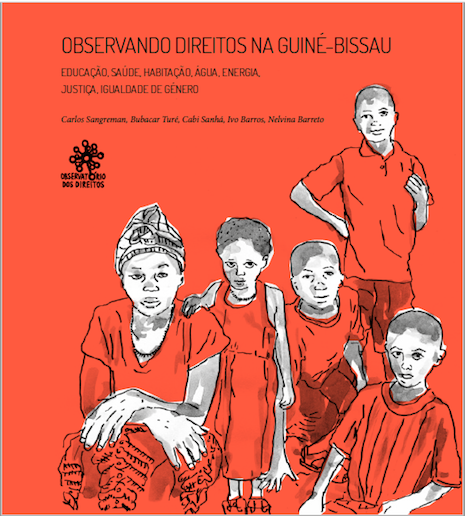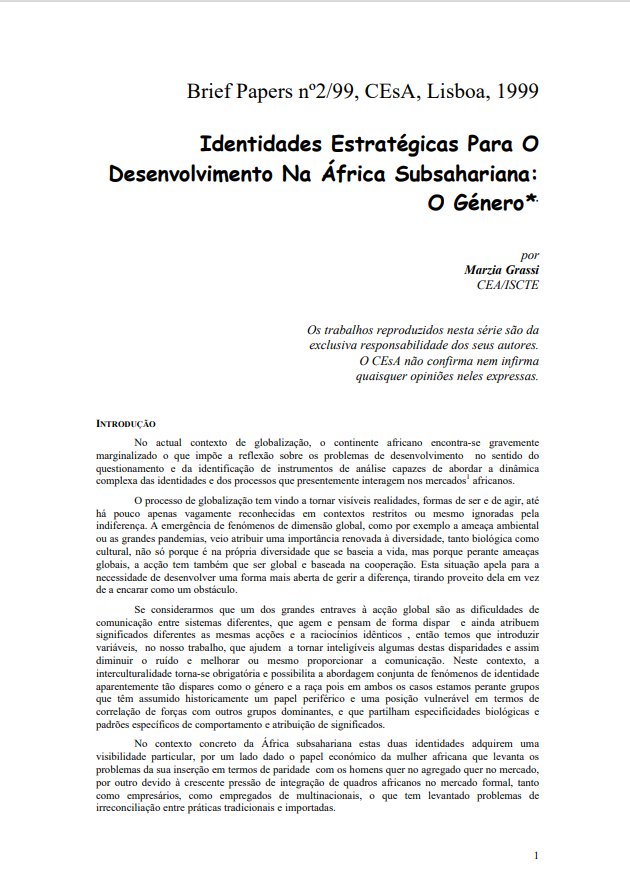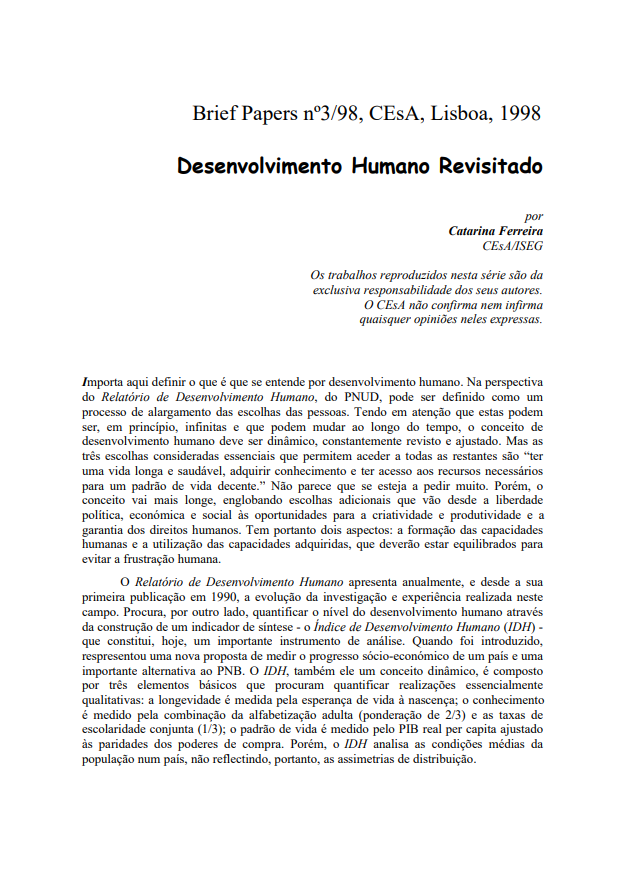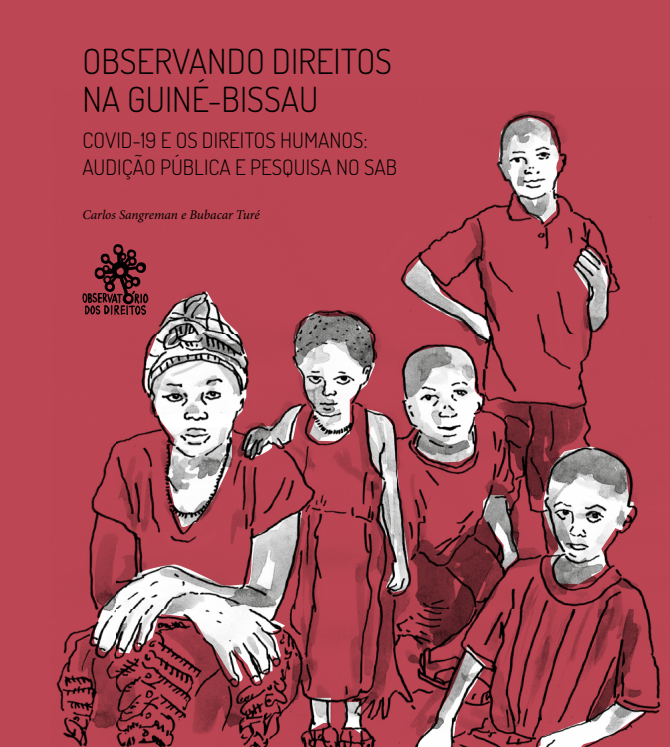Sociocultural Aspects of Development

Observando direitos na Guiné-Bissau: educação, saúde, habitação, água, energia, justiça, igualdade de género
The Rights Observatory integrated in a structure such as Casa dos Direitos is an example of what civil society can do in fragile social contexts, but where power respects the Right to Opinion (even if at some times there is repression of media outlets such as radios and television and a climate of threat to critics of the situation at the time). The data collected on access to Economic and Social Human Rights, disseminated through books and exhibitions, in order to be used by activists and responsible authorities, has even been the basis for academic research at undergraduate, master’s and, this year, doctoral levels, especially in Portugal and Brazil.
Abstract:
The objective of Observando direitos na Guiné-Bissau: educação, saúde, habitação, água, energia, justiça, igualdade de género and the Observatório dos Direitos in 2019 was to continue the collection of data on access to Economic and Social Human Rights in Guinea-Bissau with data comparable to those of 2016, and to include two innovations: a new chapter on Women’s Rights or Equality of Gender and perform data collection also in the Bolama/ Bijagós region.
Quotation:
Sangreman, Carlos [et al.] (2020). Observando direitos na Guiné-Bissau : educação, saúde, habitação, água, energia, justiça, igualdade de género. Lisboa: ACEP, com LGDH e CEsA. URL: https://www.repository.utl.pt/handle/10400.5/20866
Access the article here.

Brief Paper 3/1999: Identidades Estratégicas para o Desenvolvimento na África Subsahariana: O género
Abstract:
In the current context of globalisation, the African continent is seriously marginalised, which makes it necessary to reflect on development problems in order to question and identify analytical instruments capable of dealing with the complex dynamics of identities and processes that are currently interacting in African I-markets. The process of globalisation has made visible realities, ways of being and acting which until recently were only vaguely recognised in restricted contexts or even ignored through indifference. The emergence of phenomena with a global dimension, such as environmental threats or major pandemics, has given renewed importance to diversity, both biological and cultural, not only because diversity itself is the basis of life, but because in the face of global threats, action must also be global and based on cooperation. This situation calls for the need to develop a more open way of managing difference, taking advantage of it rather than seeing it as an obstacle. If we consider that one of the major barriers to global action are the difficulties of communication between different systems, which act and think differently and even assign different meanings to the same actions and identical reasoning, then we have to introduce variables in our work that help to make some of these disparities intelligible and thus reduce the noise and improve or even provide communication. In this context, interculturality becomes compulsory and enables a joint approach to identity phenomena apparently as disparate as gender and race, because in both cases we are dealing with groups that have historically assumed a peripheral role and a vulnerable position in terms of the correlation of forces with other dominant groups, sharing biological specificities and specific patterns of behaviour and meaning attribution. Identidades Estratégicas para o Desenvolvimento na África Subsahariana: O género (Strategic identities for development in Sub-Saharan Africa: gender) was presented at the 1st Portugal – China Congress organised by the University of Trás-os-Montes e Alto Douro in Vila Real, 19-23 April 1999.
Quotation:
Grassi, Marzia. 1999. “Identidades estratégicas para o desenvolvimento na África Subsahariana : o género”. Instituto Superior de Economia e Gestão – CEsA Brief papers nº 3-1999.

Brief Paper 3/1998: Desenvolvimento Humano Revisitado
Abstract:
Every year since it was first published in 1990, the Human Development Report presents the evolution of research and experience in this field. It also seeks to quantify the level of human development by constructing a synthesis indicator – the Human Development Index (HDI) – which is now an important tool for analysis. When it was introduced, it represented a new proposal to measure the socio-economic progress of a country and an important alternative to the GNP. The HDI, itself a dynamic concept, is made up of three basic elements which seek to quantify essentially qualitative achievements: longevity is measured by life expectancy at birth; knowledge is measured by combining adult literacy (weighting 2/3) and joint schooling rates (1/3); standard of living is measured by real GDP per capita adjusted for purchasing power parities. However, the HDI analyses the average conditions of the population in a country and does not therefore reflect distributional asymmetries. A first version of Desenvolvimento humano revisitado was prepared for Projecfo ED/96/02 Decentralised Cooperation, Fight against Exclusion and Human Development in Portugal, Italy and Belgium, an EC project being prepared by three European NGOs: ACEP – Portugal, Ricerca e Coopcrazione – Italy and ITECO – Belgium.
Quotation:
Ferreira, Catarina. 1998. “Desenvolvimento humano revisitado”. Instituto Superior de Economia e Gestão – CEsA Brief papers nº 3-1998.

Observando direitos na Guiné-Bissau: Covid-19 e os direitos humanos: audição pública e pesquisa no SAB
Abstract:
Observando Direitos na Guiné-Bissau – Covid-19 e os Direitos Humanos: audição pública e pesquisa no SAB intends to investigate the human rights situation during the Covid-19 pandemic in Guiné-Bissau between January 2020 and January 2022. The framework is based on documentary research on human rights in sub-Saharan Africa from the production of international and specialized organizations, and other non-governmental human rights defenders of the same period. For Guiné-Bissau, in addition to equal research, the communiqués and official bulletins of the “Hight commissariat for Covid-19” were also collected with the information of infected, hospitalized, recovered, deaths and vaccinations, as well as interviews with the newspapers of the Commissioner and the Secretary. With the concentration of cases in the capital, Bissau, the research organize a survey of families, of market sellers and of companies on the effects of the pandemic and the measures enacted by the Government/Presidency to contain. A public hearing was also organized in the House of Rights, with various entities ranging from the High Commissariat to Unions, journalists, and public order police to information about how each institution through its situation and action in this period. As conclusions of the analyses of all these qualitative and quantitative data, it is possible to affirm that Guinea-Bissau’s fragility has such a weight in Guinean society that a disease that has killed fewer people in the country than malaria, diarrhea or tuberculosis has not overlapped with problems arising in poverty and low incomes in general. It affected Human Rights by showing that it was already knew about the enormous shortcomings of the health system, but the effects were more graves on economic and social rights by the abrupt stagnation of economic international activity, the cooperation project, unemployment, and the rise of poverty than directly by the pandemic and measures adopted. The human rights of first generation, more political, freedom of the press and demonstration were affected, with arbitrary arrests and violence practiced by unidentified individuals intensifying the climate of impunity and feeling that the regime is becoming increasingly repressive, but it cannot be said that they were effects directly arising from the pandemic.
Quotation:
Sangreman, C., Turé, B. (2022). Observando Direitos na Guiné-Bissau – Covid-19 e os Direitos Humanos: audição pública e pesquisa no SAB. pag.93. Lisboa: ACEP, com LGDH e CEsA. ISBN 978-9898625-27-4





